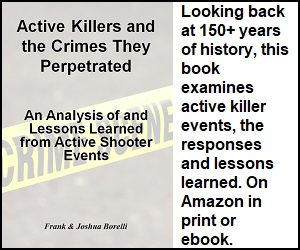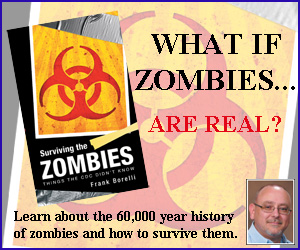I was involved recently in a conversation with a gentlemen who was trying to discover my motivations for being a police officer. He too is a police officer but we have different circumstances and situations in our lives: he is the (almost) stereotypical bachelor cop who is divorced, whose children are grown, and whose life primarily – from all outside observation – revolves around his profession as a police officer. I am married a second time, have four children – all of whom are “grown” (emancipated) – and my life certainly doesn’t revolve around my profession as a police officer. In fact, after almost 40 years, while I still characterize myself as a “contemporary warrior,” I consider myself a family man first. A large portion of my free time is spent focused on my home life. Before I go on, let me throw some definitions in here. We’ll need them for the follow on conversation.
 Ego: egotism; conceit; self-importance (for the purposes of this article)
Ego: egotism; conceit; self-importance (for the purposes of this article)
Legacy: anything handed down from the past, as from an ancestor or predecessor
Honor: high respect, as for worth, merit, or rank
Respect: the condition of being esteemed or honored
All definitions drawn from the online resource, www.dictionary.com.
Is this a discussion about which way of life is better? Absolutely not. Remember: I’m the guy who said that, to some extent, having police officers who were dedicated to the profession almost on the level of a priest’s dedication to the Church, wouldn’t necessarily be a bad thing. But lifestyle is not the topic of this article: motivation and “legacy” are.
During the conversation I had with this gentleman he asked me what I wanted my legacy to be. To be honest, and maybe I’m admitting to being slightly thick in the head, I really didn’t understand what he was asking me. He then went on to ask me if I had any “kids.” Well, of course: four. He wasn’t referring to my children; he was asking about rookies I’d trained. He went on to name three or four that he’d trained from their first day and he spoke fondly of them as if they were his own biological children. But what really gave me pause to stop and think was when he commented that, on his retirement day, he was looking forward to an auditorium full of “kids” who would be there to honor him. He spoke of this future hypothetical event as if it was his main motivation for doing his current job / performing his current duties as he does.
 The conversation made me stop and consider my own motivations and answer some questions about myself. I’ve trained hundreds of cops: not since their first day on the job and certainly not for months at a time. I served as the Field Training Officer (FTO) for a handful of police officers who have all gone on to be good cops. I’ve never considered any of them my “kids.” That’s primarily because I was so young when I FTOd them. I started my police career at 18 as a Military Policeman. I was FTOing my first trainee when I was 24. He was only one year younger than me.
The conversation made me stop and consider my own motivations and answer some questions about myself. I’ve trained hundreds of cops: not since their first day on the job and certainly not for months at a time. I served as the Field Training Officer (FTO) for a handful of police officers who have all gone on to be good cops. I’ve never considered any of them my “kids.” That’s primarily because I was so young when I FTOd them. I started my police career at 18 as a Military Policeman. I was FTOing my first trainee when I was 24. He was only one year younger than me.
But the biggest question I had to ask myself was, “Why do I do what I do?” For that officer I was talking to it seemed to be for a future where he was honored and respected. I guess that’s a good motivation but I never considered it before.
As a police officer I was always driven to “protect and serve.” I specifically sought out a small police department to work for because I grew up watching “The Andy Griffith Show”. I also grew up in a busy county where the police officers went on shift in some beats with calls waiting and left their shift the same way. I just never wanted to work like that. I don’t mind hard work but I wanted to be a cop some place where I could spend the two hours counseling a home owner on how to make their house more secure if they’d been broken into and after taking the B&E report.
 When I became a police trainer it all became about empowering the people who work behind triggers. Whether you agree with the necessity of violent response to some situations or not, I feel that it’s just wrong not to show appreciation for all of our soldiers and public safety employees. If we aren’t all doing something to support those in uniform then we are doing something wrong. So, as a trainer I’ve always been driven simply to pass good information in an efficient manner. I’ve sought to develop skill sets that I believe are valuable in today’s law enforcement environment.
When I became a police trainer it all became about empowering the people who work behind triggers. Whether you agree with the necessity of violent response to some situations or not, I feel that it’s just wrong not to show appreciation for all of our soldiers and public safety employees. If we aren’t all doing something to support those in uniform then we are doing something wrong. So, as a trainer I’ve always been driven simply to pass good information in an efficient manner. I’ve sought to develop skill sets that I believe are valuable in today’s law enforcement environment.
Does that mean I have no ego? Oh, heck no. No matter how hard my wife tries, I still have an ego. To some extent I write out of ego. I like seeing my name on articles in print and on the internet. I enjoy the feedback I get. I had an officer send me an email just last week about a news article he’d found that was about a topic we had JUST discussed during in-service training the month before.
But do I have any “kids?” No. I don’t think I’ve ever wanted them. Do I have a specific legacy I want to leave? Yep: I want to leave the world of law enforcement in a state of existence where no cop ever gets hurt on duty and certainly none ever get killed in the line of duty. Is that realistic? Nope. But it’s a great dream and goal to have, isn’t it?
I guess what really got me was when I identified the differences in lifestyle between that other officer and myself and I had to also wonder if our motivations and goals were different as a result. After all, the fraternal brotherhood seems to be most, if not all, of the family he has. Does such a lifestyle contribute to the drive to increase the size of one’s “family” by “raising kids?” Does having a wife and children at home work against such a motivation or goal?
 I left the conversation with him actually feeling bad; not because our motivations are so different, his and mine, but because I was acutely aware of the fact that I was going home to my family and he was leaving his family to go home. Such a reality has to have some bearing on how we perceive ourselves as people: I am a husband and father first, and a cop second. How does he perceive himself?
I left the conversation with him actually feeling bad; not because our motivations are so different, his and mine, but because I was acutely aware of the fact that I was going home to my family and he was leaving his family to go home. Such a reality has to have some bearing on how we perceive ourselves as people: I am a husband and father first, and a cop second. How does he perceive himself?
I know this article seems rambling and disjointed. I’m still trying to wrap my brain around the differences in motivations, lifestyles, etc. There are so many questions I still have: is one lifestyle more conducive to professional performance? Stress management? Career longevity? Is there something wrong with me for not having that drive to “leave a legacy of kids?” Is there something wrong with him for having that drive?
To some extent we all do what we have to do to protect our egos. There are so many things in every day life that can damage the ego that we vehemently protect the foundation of our own. If our sense of worth; the perception of our own self-value is dependent on the realization of a goal – such as leaving a legacy of kids – then we’ll defend that goal at a very high cost. If our ego is supported and based upon a foundation of self-worth found at home, then the leaving of a legacy in the professional world may not be as important or necessary to our functional stability.
I welcome all comments, criticisms, questions, etc. on this topic. I’m sure I’ll revisit again in the future. If you happen to be a law enforcement professional who is happily married (as much as any of us is), with children at home, but also seeking out that legacy of “kids” at work, please let me know.
BE SAFE!
